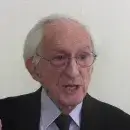
Robert Louis Kahn
Professor Robert L. Kahn is Professor Emeritus of Psychology, and Professor Emeritus of Health Services Management and Policy, who retired from active faculty status on June 30, 1988. After joining the Institute for Social Research as a study director in 1948, Professor Kahn remained at the University of Michigan for 40 years. He was promoted to assistant program director in 1951, program director in 1952, and research coordinator in 1961. He served as acting director of the Survey Research Center in 1968-69, and as its director from 1970-76. In 1948, he was appointed lecturer in the Department of Psychology; he was promoted to associate professor in 1954 and professor in 1960. He was appointed professor in the Department of Medical Care Organization, now the Department of Health Services Management and Policy, in 1980. Professor Kahn is internationally renowned for his research on organizations and as a survey research methodologist. His Social Psychology of Organizations (co-authored with Dan Katz), first published in 1966, redefined the field of organizational psychology and inspired much research by other investigators. His own empirical research on organizations is reported in several other books, including Organizational Stress, Bureaucratic Encounters, The Study of Organizations, and Work and Health. Professor Kahn is co-author (with Charles Cannell) of The Dynamics of Interviewing, a volume recognized as a classic in the field of survey research interviewing. He is also co-author (with Robert Groves) of Surveys by Telephone, the first major book on telephone interviewing. Professor Kahn's wisdom and broad expertise in the social sciences led to his repeatedly being asked to serve in leadership roles. He was elected president of the Society for the Psychological Study of Social Issues and to the Council of Representatives of the American Psychological Association. He has also served the National Academy of Sciences, the President's Commission on Mental Health, the Social Science Research Council, and the MacArthur Foundation, and has been on the editorial board of a number of journals. His current work concentrates on field experiments to create conditions that enable older men and women to improve their health and the quality of their lives.